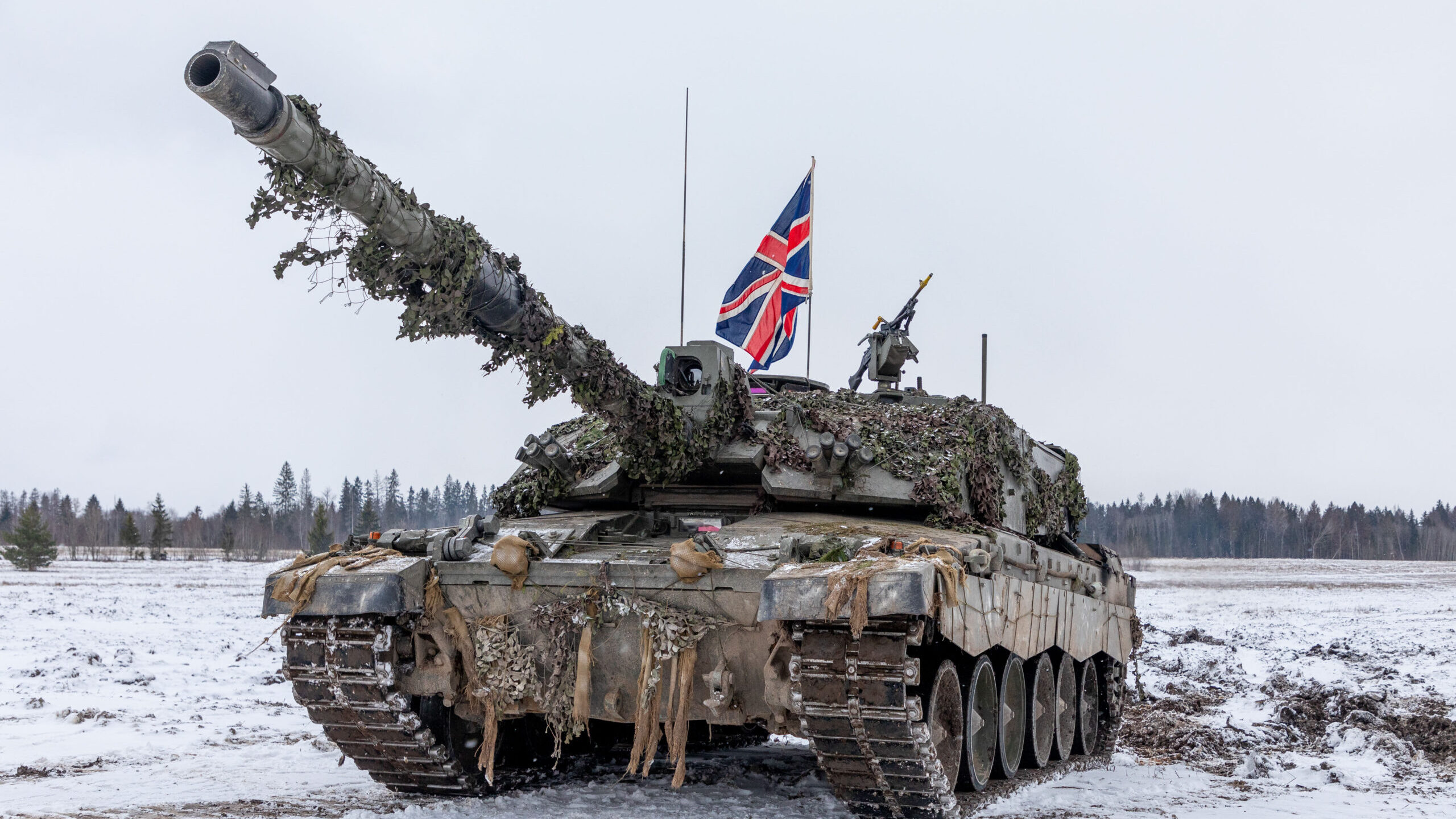
The Battlegroup forms up on the Runway, in Tapa Camp, for the start of the Brigade and Battlegroup integration phase of Exercise Winter Camp in February 2023. (British Army)
Soon the United Kingdom will publish a reassessment of the landscape of global security and the role it plans to play. In the following op-ed, the National Security Institute’s Joshua Huminski describes how Washington will likely be viewing the stance London ultimately takes.
In London, as the government of Prime Minister Rishi Sunak updates the nation’s strategic vision in its Integrated Review, Washington will be looking to see what priorities the United Kingdom emphasizes and whether they are resourced accordingly. The Integrated Review is, naturally, not about the United States. It is about the United Kingdom’s strategic assessment of its position in the world and an articulation of the policy direction in which it would like to go.
But it will also be viewed carefully and critically by London’s closest and most important ally, who will be looking for one thing above all else when it comes to the UK’s vision of China, Europe and its own capabilities: pragmatic realism.
After the recent political turmoil, Sunak can ill-afford a policy document that is long on ambition, but under-resourced in reality. While a rehash or updating of the original Integrated Review might play well to the Conservative Party base and in the Tory press, it would be less beneficial for the US-UK relationship. Indeed, Sunak’s government should see this as an opportunity above all else: a smart and savvy Integrated Review could yield much needed political capital for Sunak across the pond.
The previous Integrated Review [PDF] was a clearly ambitious document. It was largely right in its geopolitical analysis: Russia was an acute threat and China was becoming a more assertive actor. Few could have expected, at the time of writing, the speed with which these threats would mature or materialize. The challenge with the document was not its analysis, but in communicating capabilities, and in marrying resources with ambition.
Indeed, the “tilt” to the Indo-Pacific was, at least in Washington, largely interpreted as meaning the clearly defined trappings of hard power. Here, the United Kingdom would never be able to match the power projection capabilities that the United States would, and indeed is, bringing to the region. This was, in part, likely a motivating factor behind Secretary of Defense Lloyd Austin’s unhelpful remarks that the United Kingdom would be “more helpful” in the Euro-Atlantic as opposed to the Indo-Pacific. A closer reading of the Integrated Review shows that much of that “tilt” was found in soft power, economic interdependencies, multi-lateral relationships, and other non-military means—a fact that was lost in much of the coverage.
Yet, accompanying Washington’s concerns about the strategic viability of the “tilt” was the reality that the United Kingdom would not be able to marry up its ambitions with attendant fiscal resourcing. There was very little expectation that the government would be able to afford the investments in the Royal Navy the Integrated Review and its supporting defense strategy outlined. (This is not without precedent as the United Kingdom withdrew to east of the Suez after 1967 as it could not sustain the financial burden of deployments further afield.)
These weaknesses in the document reinforced, in some quarters within Washington, the United States’ growing questions as to whether a post-Brexit United Kingdom was a capable partner. Indeed, while there is much talk of the “special relationship”, in practice the trans-Atlantic partnership has been more rhetorical than substantive outside of the operational worlds of military and intelligence cooperation.
Even here there were surprisingly vocal criticisms. According to reports, a senior American general told Ben Wallace, the Defence Secretary, that Washington no longer sees the British Army as a top-level fighting force. While the Integrated Review is more than just defense, it is vital that the London’s priorities are informed by realistic appraisals of resources—a growing delta between the two will only increase doubts in Washington.
For Sunak, producing an Integrated Review that is a clear-eyed pragmatic assessment of the United Kingdom’s strategic position and priorities, however out-of-step it may be with Washington’s priorities, would be far more welcome than something that does not reflect emerging realities. Here, there are several, inter-related questions at the heart of American interests in the Integrated Review: China, the aforementioned resourcing, and European security.
First, on China and the Indo-Pacific, the new Integrated Review would do well to double-down on the AUKUS agreement and outline how it will be operationalized in practice. More broadly, while Sunak said the “golden era” of Anglo-Chinese relations is over, it remains to be seen how aligned London is with Washington’s efforts to isolate Beijing. Despite the rhetoric, thus far the Sunak government has continued the policies of his predecessors. The Integrated Review is an opportunity to signal the direction in which Sunak’s government wishes to go vis-à-vis Beijing. Yet, alignment with Washington will almost certainly become more difficult as the United Kingdom seeks to chart its own industrial policy at a time when the United States is focusing on investing its own domestic markets, which some fear is a creeping version of proto-protectionism. That alignment is, however, critical to sustain a coherent technology control policy toward Beijing.
How much the United Kingdom will be able to spend on its defense budget is the second open question, and a critical one at that. An Integrated Review long on ambition, but short on resourcing would only reinforce the questions that followed out of the first effort. It also follows how London will spend the resources agreed to by the prime minister and the chancellor of the exchequer.
Rather unfortunately, in defending his government’s defense spending priorities then-Prime Minister Boris Johnson said in November, “We have to recognize that the old concepts of fighting big tank battles on European land mass are over.” The very tanks he had hoped to cut are now being sent to Ukraine to fight their Russian counterparts. Indeed, the original Integrated Review could well have been seen as providing a strategic justification for the abandonment of the United Kingdom’s land warfare capability — London was no longer going to be part of Europe and, therefore, it no longer needed the attendant heavy, armored capabilities. It is an open question as to whether Russia’s invasion of Ukraine will prompt a reconsideration of this rationale. Ultimately, Washington will almost certainly like to see a clear reprioritization of continental European security in London’s Integrated Review. This, in particular, is an opportunity for London to demonstrate post-Brexit leadership, and would also be welcomed by Washington.
How the Integrated Review takes on the war in Ukraine, and the longer-term questions that follow about the Euro-Atlantic security architecture and Russia’s degraded conventional ground forces will be of interest to Washington. London quite rightly noted that Russia was an acute threat, but few could have anticipated how quickly the acute threat would transition into an urgent and pressing crisis. The United Kingdom notably stepped up and provided both political and moral leadership on the continent and for Kyiv, but also provided material support to the Ukrainian Armed Forces.
While the United Kingdom’s support may not be sufficient, it certainly is and will continue to be necessary. Vladimir Putin, Russia’s president, is banking on a weakening of the West’s resolve to create an opening for Moscow, and maintaining alignment between Washington and London is a pre-requisite to staving off this outcome. An Integrated Review that focuses on European continental security, and recommits to Kyiv in the face of Russia’s ongoing invasion would signal to Washington, Kyiv, and Moscow, and European capitals of London’s sustained support.
Revisiting the Integrated Review is an opportunity to update it for the current state of the world, but also to internalize the shortcomings of the previous iteration. While very much an inward-looking document, it sends strong signals to allies and adversaries alike. Washington may not be waiting with baited breath to see what Sunak does, but a smart policy document that reflects reality will only serve to boost the United Kingdom’s political capital and standing in the United States, and reinforce the already strong operational connections between the two countries.
Joshua C. Huminski is Director of the Mike Rogers Center for Intelligence & Global Affairs at the Center for the Study of the Presidency & Congress, and a George Mason University National Security Institute Fellow. He can be found on Twitter @joshuachuminski.
Air Force picks Anduril, General Atomics for next round of CCA work
The two vendors emerged successful from an original pool of five and are expected to carry their drone designs through a prototyping phase that will build and test aircraft.


























